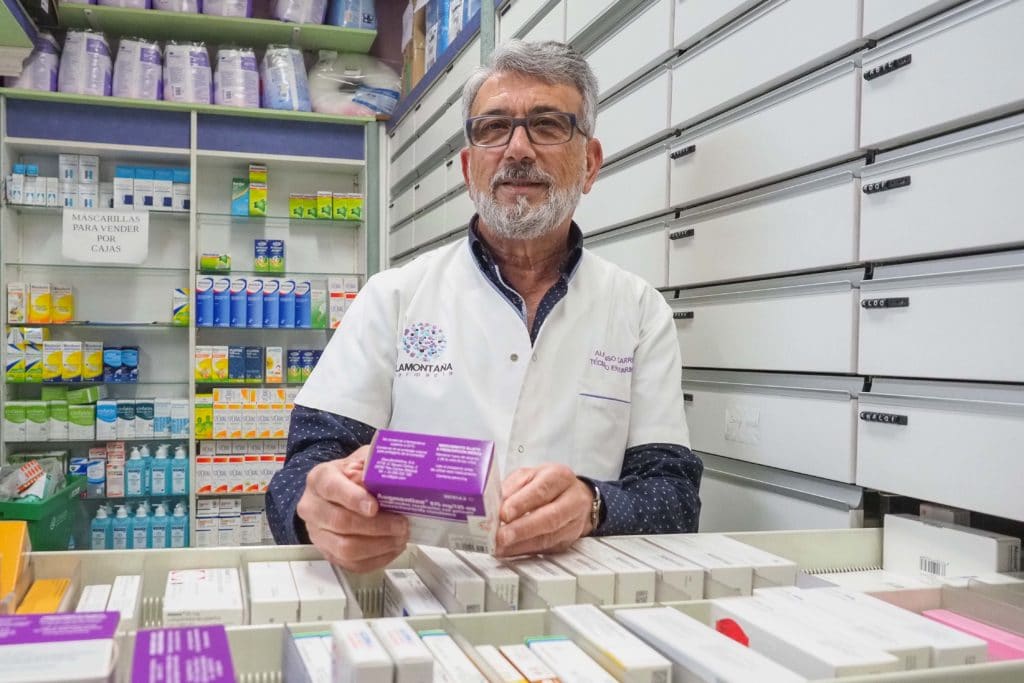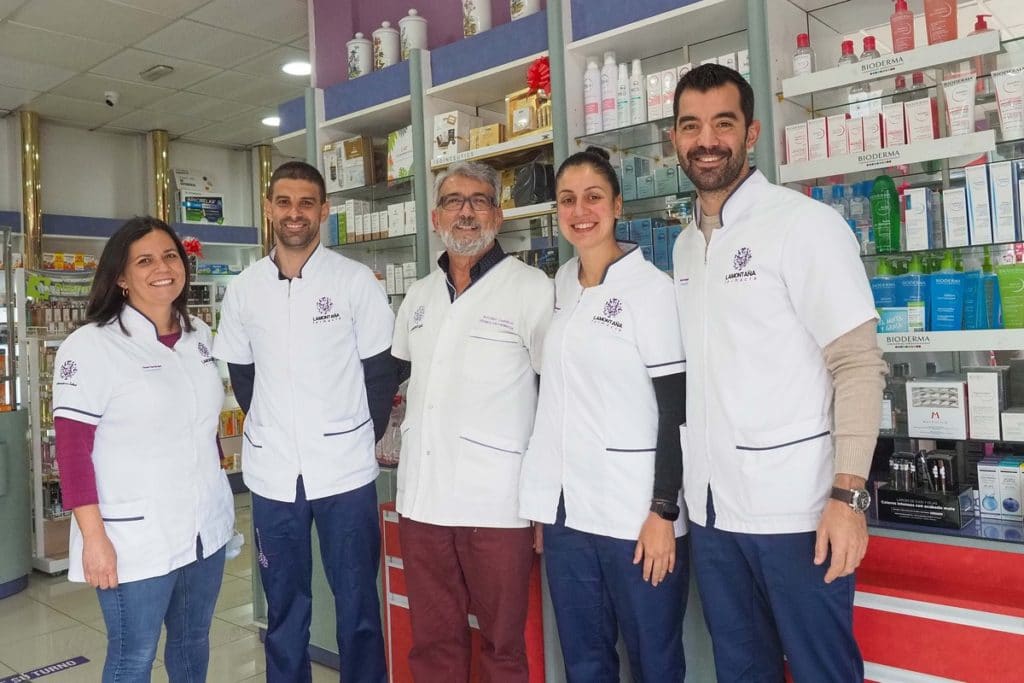
On June 3, 1976, the pharmacy was opened in La Montaña, a neighborhood in Los Realejos that at that time barely had two streets – 25 de Julio and San Cayetano – with a few homes and in which there were no doctors.
Alfonso Carrillo González opened the pharmacy together with its owner, the son of his mother’s first cousin, and remained there until last February, when he retired after almost 46 years. During that time, he not only experienced the growth of the neighborhood but also of the pharmacy, which he considers his family.
Alfonso is a native of San Juan de la Rambla but his heart is broken between this municipality and his neighbor in Los Realejos where he lives, because he married a croissant.
When he started he was 19 years old. In the mornings and afternoons he worked and at night he went to classes in Icod de los Vinos where he studied high school and then COU (University Orientation Course).
He had no knowledge of pharmacy, little by little he gained experience. “At first there was no work because people left the doctor, who attended in the center of the municipality and bought in the pharmacies there,” he says.
He assures that it cost a lot to get the pharmacy going. It was two neighbors, Faustino Hernández and Manuel González Mesa who, at that time, went house to house looking for cards to justify a Social Security doctor in the neighborhood and finally got it.
“I changed every nine months and attended the private consultation of another professional from Monday to Friday,” he recalls.
In the mid-1970s, the concept of pharmacy was far from what it is today. The medicines were arranged outside, where the public could easily take them. “There were only two parapharmacy shelves,” he details.
The tablets were classified as ‘expiry and non-expiry’ because at that time “there were medicines that did not expire and there was no risk that someone would take them or take them away. There was not even a prescription required for psychotropics and tranquilizers.”
Alfonso gradually experienced changes in the business, just like those of a neighborhood that grew until it became one of the main towns in the municipality. He lived through the passage from prescriptions by hand, to those issued on paper and finally to electronic ones. “Normally the first ones understood each other, but when there was any doubt the doctor was called,” he points out.
Between the 80s and 90s he witnessed the problems caused by drugs and their consequences. “False prescriptions began to appear, people managed in any way to look for tranquilizers,” he asserts.
On one occasion a man arrived at the pharmacy with his body completely in plaster and the prescription in one hand “which was obviously false”. He realized his problem, so he got him to sit down and offered him water.

She can’t help but laugh when she recounts that on another occasion, a man “wanted to make it so perfect” that the date he put on the prescription was for the next six months. “I had to tell him to come back,” he says.
Alfonso and the owner of the pharmacy “always had to keep the fly behind their ears” for everything. “Because in the same way that you knew when someone came looking for a box of condoms, because they weren’t in a hurry and let all the people behind them pass, or they asked you for a box of aspirin and winked at you, you knew who was coming with the fake recipe,” he says.
While he faced this reality during the day, at night he studied pharmacy assistant by correspondence. Years later, she attended all the seminars, courses and talks that were given in Santa Cruz on drug addiction, antibiotics, cosmetics, sales and marketing techniques and even makeup. “Everything that was there we took advantage of,” he says.
Then he got the title of Technician Specialist in Industrial Electronics, because he always liked it and finally, he decided to study Pharmacy Technician while he continued advancing in the work and the place grew with the incorporation of a laboratory that at that time enjoyed great prestige. and from which neighboring neighborhoods such as La Zamora, La Cruz Santa and La Vera also benefited.
In a marketing course they suggested to him to modify things. The first thing he did was change the shelf where the syrups were and put perfumes, merchandise that he was beginning to incorporate. The second was to remove the medicines from public view and store them inside, previously classified by type.
He always worked thinking that the pharmacy not only belonged to its owner, but also his. “Each one in his position. If I fought for it to grow, I benefited because I had a job, while he risked his capital to get it going, ”he underlines.
That close, cordial and familiar treatment that Alfonso provided daily for almost 46 years was recognized by the neighbors of the neighborhood during a tribute they recently paid him in the neighborhood square on the occasion of his retirement.
At that moment, he received congratulations from a lady who said: “Congratulations on retirement: I still have the phrase you wrote me when I was sick with cancer.” She gets emotional when she tells it.
“I always had a tendency to ask how they were doing and clients would tell me their problems and I would write to them or tell them something,” he says.
One night, during a guard, a girl with a sad face arrived and he only valued her. “Do you realize what a wonderful person you are?” she told him. And the young woman began to cry. She thought that she “had screwed up”, they were talking until finally the girl ended up thanking her for her words.
He also remembers that he treated an older couple, the woman had severe conjunctivitis. Seeing her, he recommended the man to take care of her wife “because he was not going to get another like her.” The next day, at 08:30 in the morning, Mrs. Ella crossed the street and went into the pharmacy to tell her that she was going to the clinic and that her husband had asked her how her eyes looked. “She blew me away,” she confesses. “The husband, who like many men of the time seemed quite macho, had not realized how the lady was.”
Alfonso always had that close relationship with his neighbors. He not only dispensed the medicines they needed for the body but also for the soul. He never hesitated to listen to them when they needed him, whether it was to ask for advice, tell him about a problem or share a secret.
“We have lived and shared moments of joy but also of pain, illness, death. Many people have left. I have lived the pharmacy as a family”, she emphasizes.
It is enough to have a coffee with him in a cafeteria in La Montaña, near his old job, to see the number of people who come to greet him, to ask how he is, to hit the man as a sign of affection and gratitude.
At the moment he has no special plans for the future. He is a collaborator of Cáritas in the Holy Cross, a beautiful job that also takes time and he attends singing, musical reading and choral classes at the La Orotava Music School. Music is another of his great passions. “I am going to see how I am organizing myself, what I am clear about is that I am not going to stop because I have always been working during the day and doing something at night”, he assures.
















